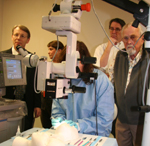|
|

|
Donation creates elite endowed chair
|
by Megan Fink
Public Relations
MUSC now has one of only two international ophthalmology chairs in the
country thanks to a large gift from longtime Storm Eye Institute (SEI)
patient and donor Bruce G. Pratt, DVM. In addition to establishing the
prestigious chair, the $1.5 million donation will be used to attract
and train American eye surgeons who plan on serving developing
countries around the world.
 Drs.
Ed Wilson, left, and Bruce Pratt, far right, observe Dr. Helga Sandoval
make an opening in the lens sac of a pig’s eye. Sandoval replaced the
cloudy natural eye with an artificial lens. Drs.
Ed Wilson, left, and Bruce Pratt, far right, observe Dr. Helga Sandoval
make an opening in the lens sac of a pig’s eye. Sandoval replaced the
cloudy natural eye with an artificial lens.
A retired veterinarian from Beaufort, Pratt has been coming to SEI for
eye care for more than half-a-century. The endowed chair donation is
not Pratt’s first gift to SEI. A teaching and videography room located
in the institute also bears Pratt’s name. The philanthropist also
enjoys fishing and spends a large portion of the year in Costa Rica, a
country plagued with preventable blindness in both its child and adult
populations. This is where Pratt noticed a need for modern eye care.
“I wanted to support Storm Eye Institute because of the excellent care
that Storm Eye has provided to me for 50 years and because of the work
that the SEI International Center does in the developing world,” said
Pratt. “I have seen the impoverished in Costa Rica whose sight could be
saved by the type of cataract surgery that Dr. (Edward) Wilson (SEI
chairman) will be training U.S. ophthalmologists to do in areas like
Costa Rica, Guatemala and Ethiopia. More specifically, I have a close
friend in Costa Rica who is going blind with glaucoma and a detached
retina because of a lack of good ophthalmic care.”
Within the scope of international ophthalmology, SEI will provide an
annual course for American eye surgeons who are preparing to serve
overseas. In addition, the Pratt professor would oversee all the
activities involved with bringing international teachers to MUSC to
train; educating the teachers before they return to their native
country. A portion of Pratt’s gift was put into an expendable fund to
finance these projects associated with the international ophthalmology
chair program.
“It’s incredibly important, because Dr. Pratt has been coming here for
eye care for more than 50 years and has given to us before,” said
Wilson, M.D. “I think this is much closer to his heart. He spends much
of his time in Central America and knows firsthand some of the
preventable blindness occurring in that part of the world. He’s going
to help us contribute to eradicating preventable blindness.”
Several factors contribute to the high incidence of cataracts, or
clouding of the eye lens, among developing nations and indigent
populations. Factors include poor nutrition, prolonged exposure to
ultraviolet light, and a lack of preventative eye care. To repair a
cataract-inflicted eye, surgeons insert an artificial lens to replace
the damaged natural lens.
Friday, March 20, 2009
|
|
|



